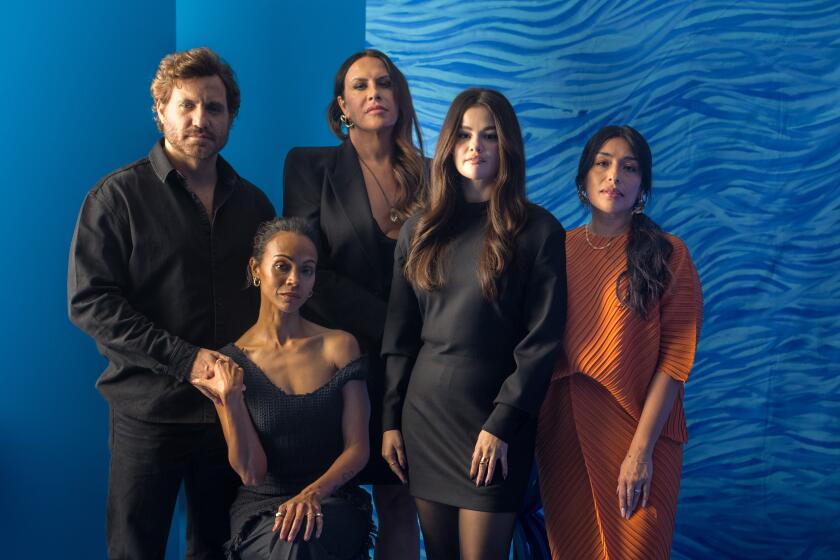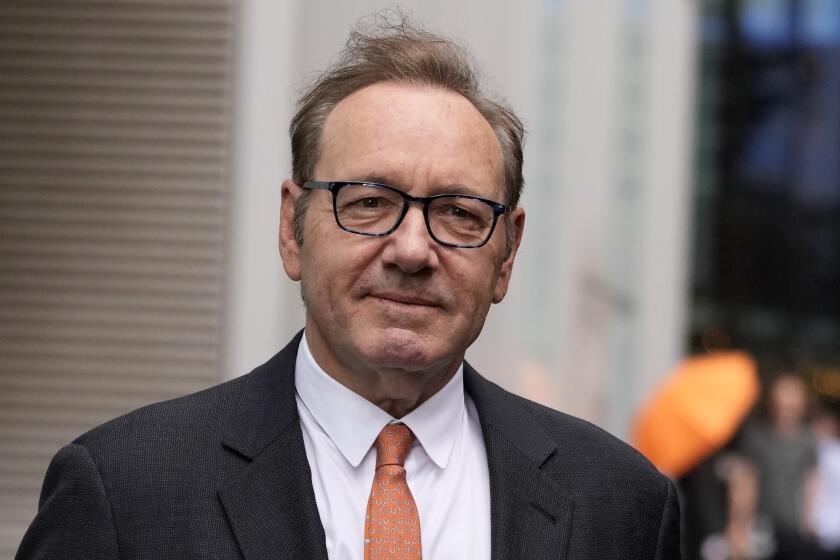‘12th and Delaware’ filmmakers: from ‘Jesus Camp’ to the abortion issue
It’s not like Rachel Grady and Heidi Ewing are new to the making of powerful documentaries. But even for them “12th and Delaware,” which debuted Sunday at Sundance, was a disturbing, unnerving experience they don’t hesitate to describe as life-changing. When Ewing half-jokingly tells someone, “I hope it haunts you for the rest of your days,” she is referring as well to what it did to them.
To say that the subject of their heart-rending new film is abortion in America is in some ways not saying enough. In a style that is more powerful for being low-key -- “the whole thing is like a whisper,” says Grady -- “12th and Delaware” focuses on two establishments that share a corner in Fort Pierce, Fla., as well as on the women who patronize them, but it goes deeper than that.
“It’s beyond being into their heads,” Grady says. “We’re inside their hearts.”
On one side of the street is an abortion clinic, and on the other is an anti-abortion crisis pregnancy center (or CPC), one of more than 4,000 such places in the U.S. set up to look like clinics but with the purpose of persuading women to continue with their pregnancy.
These establishments have never previously been filmed from the inside and Grady and Ewing only heard about them because a mother of one of the children they followed in their earlier “Jesus Camp” worked at a CPC that actually shared a partition (dubbed “The Wailing Wall”) with an abortion clinic.
Because they found the CPCs, in Ewing’s words, “upsetting, shocking, disturbing, confusing,” they were not eager to make one of them the subject of their next film. “We wanted to move on, we were tired, weary of conservative America.” But Sheila Nevins, who runs documentaries for HBO, was compelled by the idea, and so the film was begun. It was not an easy process.
For one thing, it took Grady and Ewing a year and a half to gain access to a facility. Then it took a year of filming to get the job done, a year that the filmmakers, who call 12th and Delaware “that miserable corner,” say was the most difficult and challenging of their careers.
Initially, the film was to be only about the CPC, and Grady and Ewing make being there sound like combat. “It was excruciating,” says Ewing, “like Lars von Trier had assigned us to make a Dogme film on this corner for a year.”
Adds Grady, “It was banality and flashes of total emotional drama, flashes that would send you to the moon.”
The experience was especially difficult because of the fragile emotional state of the women -- often teenagers -- who came into the CPC.
“Honestly, that was the hardest thing for us as two women,” Grady says. “We really had to be objective and watch extremely vulnerable women not get comforted, not get relief. That wasn’t our role, but it hurt. I would just be dying, these girls were in so much pain, I felt like a traitor because I couldn’t do anything about it.”
Despite their initial plans to the contrary, the filmmakers, who favor abortion rights, came to feel that including the abortion clinic across the street was, says Ewing, “the natural flow of the movie.” The clinic, besieged by the verbal assaults of anti-abortion picketers, was, says Grady, “the only reason the CPC existed. It was the elephant in the room.”
Making “12th and Delaware” turned out to be eye-opening for the filmmakers in another way: It made them feel that the anti-abortion forces, in Grady’s words, “are winning the hearts-and-minds campaign. Abortion is still legal, but there’s a huge taboo about it. Who cares if it’s legal if no doctor will train to do it?”
“While we were sleeping,” says Ewing, “the pro-life side organized a cultural campaign. A recent Gallup poll showed that for the first time more than half of the country identifies itself as pro-life. They have an unpaid multitude of soldiers and they’re more revved up; they think it’s murder, so of course they’re revved up.”
As Grady sees it, “You’re dealing with zealots and you will lose to a zealot.”
The filmmakers say they see this change even in casual conversations they’ve had with women who’ve had abortions.
“Women in their 50s or 60s,” says Ewing, “are very direct about it, but younger women are not. It’s been stigmatized because the culture has changed.”
Both women also feel strongly that at its heart this struggle, in Grady’s words, “has nothing to do with babies. Its about control, it’s about the power of women and women’s roles, what the purpose of the female gender is, the absolute core of the identity of a woman. It’s so profound and so deep.”
Grady and Ewing have shown “12th and Delaware” to the abortion clinic and to the CPC, and both sides, the filmmakers report, said it was fair. Ordinarily that would be enough for documentarians, but for a project like this something else is wanted.
“We want this to be a wake-up call,” Ewing says. “If this movie doesn’t get seen, we let those girls down. This has got to be worth it.”
More to Read
Only good movies
Get the Indie Focus newsletter, Mark Olsen's weekly guide to the world of cinema.
You may occasionally receive promotional content from the Los Angeles Times.











